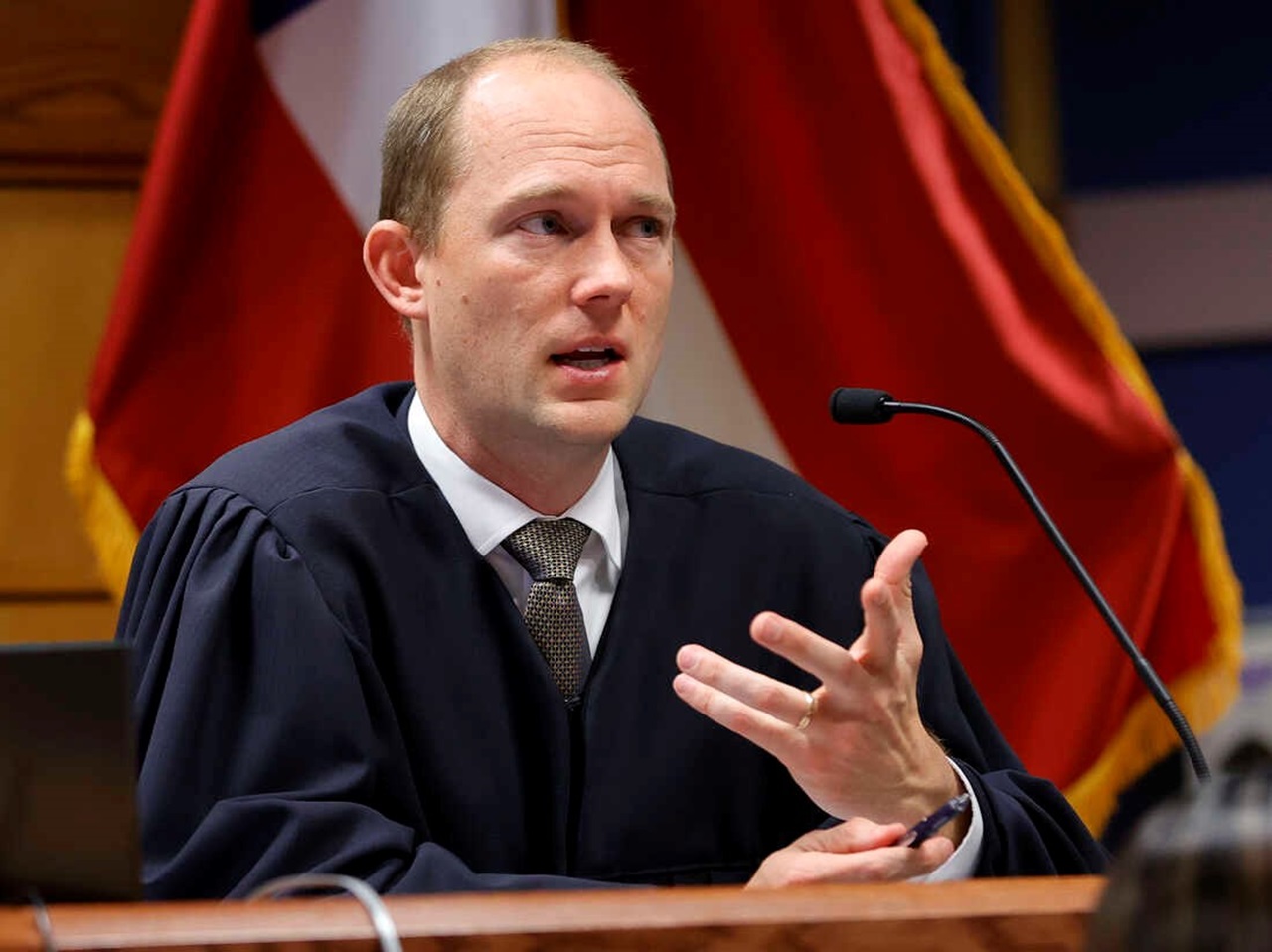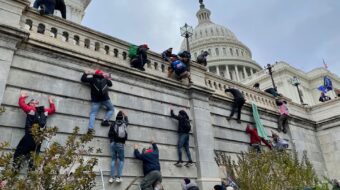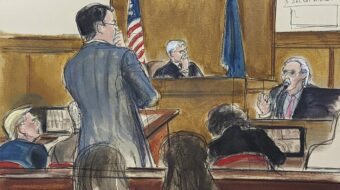
ATLANTA —In a win for former Republican Oval Office occupant Donald Trump, Fulton County (Atlanta) Superior Court Judge Scott McAfee tossed out six of the multiple counts against Trump for trying to steal Georgia’s electoral votes four years ago.
The net effect of the judge’s order, legal scholars said, is to further postpone the trial of Trump and his co-conspirators on racketeering and conspiracy. And stallball is Trump’s ultimate legal game.
The judge’s order moves the Atlanta trial ever closer to—if not beyond—this fall’s presidential election. There, Trump will again be on the ballot as the Republican presidential nominee against Democratic incumbent Joe Biden.
That makes the election itself even more important, given Trump’s prior anti-worker actions and words, including his attempts to trash federal worker unions and to curb OSHA’s labor-supported try to curb exposure to the coronavirus.
Trump has a think-tank creating an even more anti-worker platform, along with dictatorial moves, ready for him to implement should he win this fall.
Trump isn’t completely out of the legal woods, though. He still faces a March 25 criminal trial in New York on hush money payments to adult film star Stormy Daniels to cover up their affair, and federal indictments in D.C., for trying to deprive people of their right to vote by stealing the election, and in Florida for purloining secret papers to his Mar-a-Lago estate, then revealing them.
In his March 13 order, Judge McAfee threw out counts where Trump’s lawyers alleged Fulton County District Attorney Fani Willis didn’t have enough specificity to let them give him a proper defense.
The judge said that wasn’t necessarily the DA’s fault. He ruled she relied on vague U.S. and state constitutional provisions. And Judge McAfee said Willis could come back with a new, more specific, indictment on those counts.
“This does not mean the entire indictment is dismissed,” Judge McAfee, a former put in warned in a footnote.
May seek re-indictment
“The state may also seek a re-indictment supplementing these six counts. Even if the statute of limitations has expired, the state receives a six-month extension from the date of this order to resubmit the case to a grand jury,” the judge ruled.
“Alternatively, the state”—through Willis’s office—“may request a certificate of immediate review,” of his order, “which the court would likely grant due to the lack of precedential authority.”
Overall, the judge tossed six counts, as Trump’s attorneys sought. Three are against Trump and three against his co-defendants, all involving conspiracy to steal Georgia’s electoral votes four years ago. The racketeering counts in the case stand.
One count Judge McAfee tossed dealt with Trump’s now-infamous phone call to Georgia Secretary of State Brad Raffensperger, also a Republican, but Georgia’s top elections official, demanding Raffensperger “find” the 11,780 popular votes Trump needed to swing Georgia’s electoral votes into his column, by one ballot.
In short, to steal the election. In the testy—and recorded—call, Raffensperger rejected Trump’s demand.
“The court’s concern is less that the state failed to allege sufficient conduct of the defendants,” including Trump and his remaining co-conspirators. “In fact, it has alleged an abundance,” Judge McAfee wrote.
“However, the lack of detail concerning an essential legal element,” which he called “the underlying felony they solicited,” kills those six counts.

“As written, these six counts contain all the essential elements of the crimes but fail to allege sufficient detail regarding the nature of their commission…They do not give the defendants enough information to prepare their defenses intelligently, as the defendants could have violated the constitutions and thus the statute in dozens, if not hundreds, of distinct ways.”
“On its own, the United States Constitution contains hundreds of clauses, any one of which can be the subject of a lifetime’s study,” McAfee wrote. That means Willis and her team must be more specific when they charge Trump and his minions conspired to have Raffensperger find the fake voters or have the Republican-dominated—and GOP-gerrymandered—Georgia legislature toss out Biden’s electors and substitute Trump’s take electors.
Previously pled guilty
One fake Georgia elector, also named as a co-conspirator, previously pled guilty to reduced charges and turned state’s evidence, singing to Willis and her team.
Anthony Kreis, a constitutional law professor at Georgia State University who has followed the prosecutions, told the Associated Press Willis has at least one good reason to come back with new, more specific, versions of those six conspiracy counts.
“I think Willis was really trying to tap into a theme that what Trump and others were trying to do was upend constitutional order and violate the heart of our democracy. These charges spoke to that in a way that some of these other ones don’t and so I think she’ll be loath to let this go.”
In a related development, the same day Judge McAfee tossed some of Willis’s indictments, Kemp signed a new version of a state law setting up a special commission that could toss any prosecutor out on her ear, after hearings and evidence. The Georgia Supreme Court ruled a prior version of that statute, passed on party lines, was too vague.
Party leaders denied both the old law and the new were aimed at Willis in revenge for indicting Trump. Political analysts don’t believe that.
The judge issued his surprise ruling yesterday when it was expected he would rule on whether Willis can remain on the case. The is no indication when he will make that decision. There has been no proof presented that Willis profited, as Trump lawyers allege, from anything she did related to the case. The delay in a ruling on this is also another example of judicial foot dragging which always seems to come out in Trump’s favor.
Meanwhile, in a federal trial against Trump in Florida, his lawyers are going to court today to have the entire case tossed out. They told Trump-named U.S. District Judge Aileen Cannon that Trump was entitled “as a former president” to keep the classified documents he purloined from the White House and shipped to his Mar-a-Lago estate.
Trump’s lawyers also argue the law Justice Department Special Counsel Jack Smith used to charge Trump, the World War I-era Espionage Act, is “unconstitutionally vague.”
Past federal prosecutions under that law have aimed at reporters who were leaked classified documents, the leakers and—during that war—supposed spies and conspirators, including German sympathizers but also leftist anti-war activists, including labor leaders.
There are two ironies about Judge McAfee, a former Assistant U.S. attorney and state prosecutor. One is that as a state assistant DA, he once worked under Willis. He’s also handling charges to disqualify her from the Trump case on conflict-of-interest grounds. The other is that Judge McAfee must face the voters in two months.
Like many states, a judge whom a governor names to the bench must face a retention election by the voters at the first available balloting. Gov. Brian Kemp, R-Ga., whom Trump operatives also tried to pressure, put Judge McAfee on the bench. The judge faces election in May for a full four-year term.
We hope you appreciated this article. At People’s World, we believe news and information should be free and accessible to all, but we need your help. Our journalism is free of corporate influence and paywalls because we are totally reader-supported. Only you, our readers and supporters, make this possible. If you enjoy reading People’s World and the stories we bring you, please support our work by donating or becoming a monthly sustainer today. Thank you!












Comments